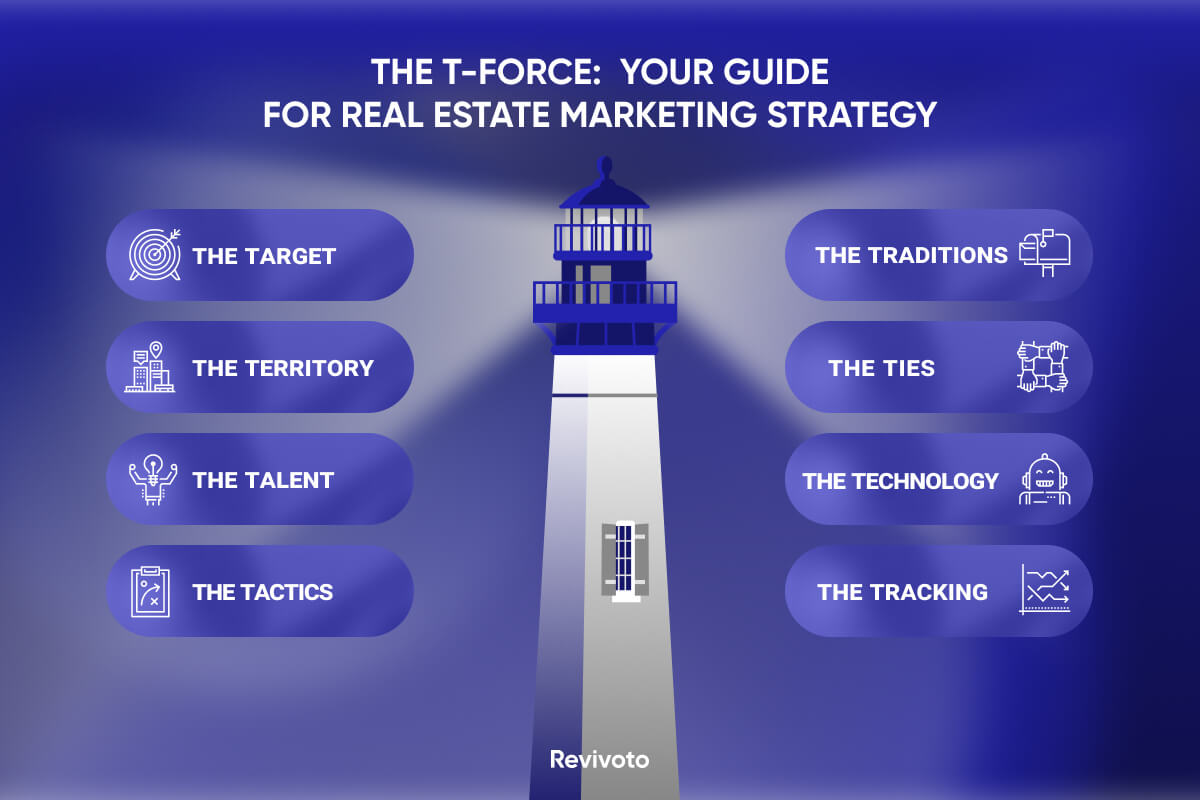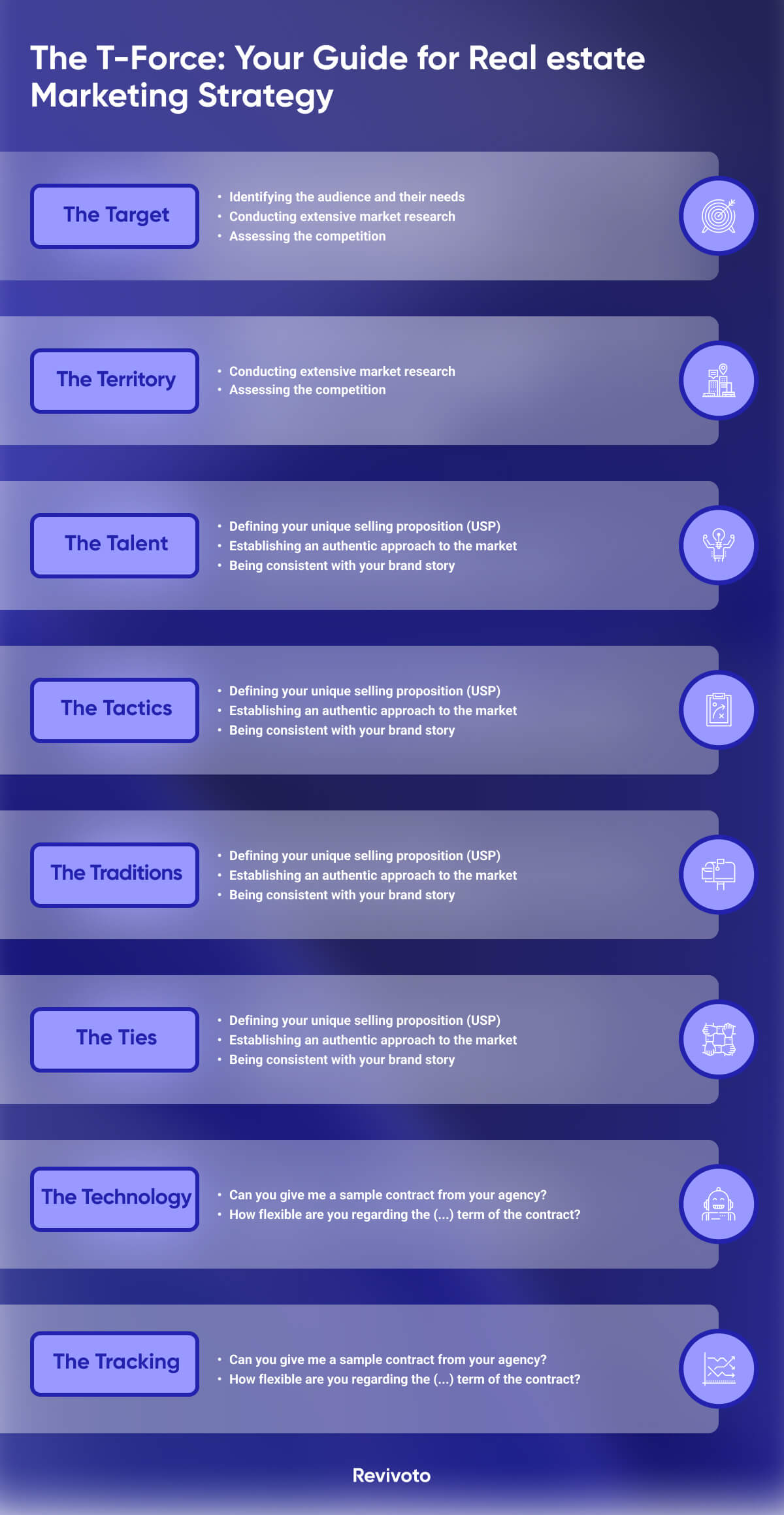“Strategy is about making choices…; It’s about deliberately choosing to be different.”
It’s all about the big picture – When thinking about marketing, various creative ideas bounce through our heads, but real estate marketing strategy is not about them! A practical marketing strategy acts as a roadmap, showing what you’ve got, what you need to get, where you’re headed, and when all these are happening or is supposed to happen.
Think of it this way: all your efforts for being a successful realtor are your lantern, lighting where you are at each point. Meanwhile, your marketing strategy is your lighthouse – marking your goal and clarifying the road ahead. A properly functioning lighthouse keeps you from going in the wrong direction or getting lost.
So, here is what we’re going to do: we’ll give you all the material you need to build your one-of-a-kind marketing strategy lighthouse. Let’s call this guide your T-Force!

Table of Contents
1. The Target
Knowing your audience is one of the most critical steps in developing a successful real estate marketing strategy. That involves identifying the target audience, understanding their needs, conducting market research to grasp the local real estate landscape, and analyzing the competition to identify areas of opportunity and differentiation.
Identifying the target audience:
The first step in developing a successful real estate marketing strategy is identifying the target audience. That includes understanding their demographics, such as age, income, lifestyle, etc.
Determining the target audience’s needs:
to perform well as an agent, you must be aware of their wants and needs before they are. By knowing the preferences of your target group when buying or renting properties, you get a clear picture of their priorities. Through that, you can develop targeted marketing campaigns that speak to their interests and pain points.
2. The Territory
In addition to understanding the target audience, it’s crucial to be fully aware of the market and all its hidden corners. Here is what you need to do:
Conducting extensive market research:
to unravel the local real estate landscape. You should consider market trends, property values, and supply and demand in the area. Through that, you can identify areas of opportunity, such as up-and-coming neighborhoods or properties in high demand.
Assessing the competition:
Finally, it’s essential to analyze the competition to identify opportunities and points of differentiation. Knowing the marketing strategies of other real estate agents in the area, identifying what works and what doesn’t, and developing strategies to differentiate from the competition could clarify the status of the market. For example, an agent may set their brand by specializing in a particular property type, such as luxury homes, or by offering unique services, such as virtual staging or drone photography.
3. The Talent
Your stronghold is who you are and what makes you different from any other agent. You should clarify your unique selling proposition, establish your authentic approach to the market, and be consistent with your story.
Defining your unique selling proposition (USP):
Your USP sets you apart from other agents in the market. It could be your expertise in a particular property type, exceptional customer service skills, or ability to close deals quickly. Once you have identified your USP, highlight it in all your marketing materials and communications.
Establishing an authentic approach to the market:
To differentiate yourself, you need to identify what your competitors are doing and do it differently or do something that they’re not doing. That could be as simple as having a unique approach to social media, offering a specialized service that is uncommon among other agents, or having a specific niche.
Being consistent with your brand story:
Your brand is your identity and should be consistent and appealing across all your marketing materials. That includes your logo, profile photos, website, business cards, and social media profiles. Instead of trying to be like other agents in the market, be yourself and let your personality shine through in your brand story. That will help attract clients looking for someone they can relate to and trust.
4. The Tactics
To embark on marketing in action, you need to decide on your methods and what works on your turf. This part begins by identifying what you’re going to say, how you’ll say it, and where.
Choosing the right marketing channels:
Once you know your target audience, you can pick the best marketing platforms to reach them. Social media is a popular channel for real estate marketing, with platforms like Facebook, Instagram, and LinkedIn offering opportunities to showcase your listings, share valuable content, and connect with potential clients. Email marketing is another effective way to reach your target audience, especially if you have a strong email list.
Creating compelling content:
No matter which marketing channels you choose, your content must be effective and engaging. Consider the types of content that will resonate with your target audiences, such as blog posts, videos, property listings, virtual tours, or market reports. When creating content, focus on providing value and showcasing your expertise. Share tips and insights on the real estate market, provide updates on local events and attractions, and showcase your listings to highlight their unique features.
Keeping it Consistent:
Consistency is vital when it comes to real estate marketing. Your brand should be coherent across all marketing channels, with a clear and compelling message that sets you apart from your competitors. Ensure your branding, tone, and messaging are consistent in all your marketing efforts. It is best to post regularly on social media, send out regular email newsletters, and periodically update your website and property listings.
5. The Traditions
As a real estate agent or broker, you can always go for traditional marketing methods. Here are some old ways to take advantage of their benefits in a new way:
Hosting Open Houses:
Open houses are an excellent way to showcase properties and generate interest. They allow potential buyers to view the property in person, ask questions, and get a feel for the space. To bring this method to the 21st century, you can promote the open house on your website and social media channels. You can also have a live stream of the open house.
Using Print Media:
While digital marketing is essential, print media can effectively reach a wider audience. Consider advertising in local newspapers and magazines or distributing flyers and postcards in targeted neighborhoods.
Advertising on Billboards, Radio, and TV:
Billboards can be a powerful way to increase brand awareness and visibility. You can opt for high-traffic areas where your target audience will likely see them and ensure the message is clear and concise. Radio and TV ads are still effective for reaching a large audience and building trust. Consider running ads during peak listening or viewing times, and make sure the message is targeted to your audience.
Remember, the key to successful traditional marketing strategies is to make sure they are targeted and strategic. Don’t just advertise anywhere – choose the channels that will reach your target audience and make the most impact. Also, try to mix and match these methods with novel ones and upgrade them.
6. The Ties
Networking and referrals can be a powerful way to generate leads and build trust and credibility within the real estate industry. Here are some tips on how to include it in your real estate marketing strategy:
Building Relationships with Local Businesses:
A great way to get leads and referrals is to build strong relationships with local businesses. Make a list of possible candidates – with home improvement stores, moving companies, and other businesses relevant to the real estate industry – and consider partnering with them. That can help you gain access to a broader audience and generate referrals from locals that have a similar target market.
Using Referrals from Past Clients:
One of the most effective ways to generate leads is through referrals from satisfied clients. Ask your clients for referrals and create a system for tracking and following up on these referrals. You can also incentivize your clients by offering them a reward or discount for referring friends and family.
Joining Real Estate Organizations:
Joining a local or national real estate organization can provide you with valuable connections and resources to help grow your business. Attend industry events and conferences, participate in networking events, and consider joining a mentorship program to learn from experienced professionals in the industry.
7. The Technology
Technology has revolutionized the real estate industry and made it possible to market properties more engaging and innovatively. Here are some ways in which real estate agents and brokers can employ technology and take their marketing to the next level:
Leveraging virtual staging and tours:
Virtual staging and 360 tours allow potential buyers to get a 3D view of a property, which helps them to visualize the space and layout more effectively. This technology is particularly beneficial for buyers unable to attend open houses or in-person viewings.


To order virtual staging at an unbeatable price click below!
Using drones for aerial photography:
Drone photography is a great way to showcase the full scope of a property – especially if the estate has a large plot of land or a unique feature such as a swimming pool or outdoor living area. Aerial photography and videos can help to provide a sense of the surrounding neighborhood and community.
Taking advantage of artificial intelligence (AI):
This aspect of technology has become increasingly prevalent in the real estate industry. You can use AI tools like ChatGPT for content marketing efforts. Additionally, AI-powered chatbots can provide instant customer service and response time, which can be particularly helpful for busy agents and brokers.
Using technology in real estate marketing can help agents and brokers reach a wider audience and provide a more engaging experience for potential buyers. You must stay up-to-date on the latest technology trends to remain competitive and relatable.
8. The Tracking
Embarking on any road, you need to stop every once in a while and assess the distance you’ve come, where you are, and future directions. Here are some ways to make the most of metrics and analytics in your marketing strategy:
Tracking marketing efforts:
This will help you understand which channels drive the most traffic and leads to your website or generate the most interest in your properties. You can use tools like Google Analytics, social media insights, or email marketing metrics to get a better understanding of how your marketing efforts are performing.
Measuring return on investment:
As a real estate agent or broker, you want to make sure your marketing dollars are being spent effectively. That’s why measuring your marketing campaign’s return on investment (ROI) is critical. You can calculate ROI by dividing the revenue generated from a campaign by the cost of the campaign.
Analyzing customer engagement:
Understanding how your target audience interacts with your content is crucial to making informed decisions about your real estate marketing strategy. You can analyze customer engagement by looking at metrics like website traffic, social media engagement, and email open and click-through rates. Use this information to identify which types of content your audience finds most engaging and adjust your strategy accordingly.

Final word
You are all set to draft your real estate marketing strategy using the T-Force. We have also made you a bonus questionnaire to assist you on this road. Keep in mind that no two lighthouses are identical, so your marketing strategy must be tailor-made for you. Your uniqueness must be reflected in your choices because the goal is “deliberately choosing to be different.”
FAQ
- Setting a Google Business Profile
- Having a mobile-friendly website
- Developing SEO content
- Using professional photography
- Taking advantage of social media
- Running strong email campaigns
- Creating useful infographics
- Making iconic logo and business card
- YouTube
There are 8 steps in establishing and working with your real estate content marketing strategy:
- Setting your goals
- Defining your audience
- Choosing a Content Management System (CMS)
- Picking your platforms and the type of content
- Setting your editorial calendar
- Preparing your content accordingly
- Distributing your content
- Evaluating its feedback and assessing ROI


